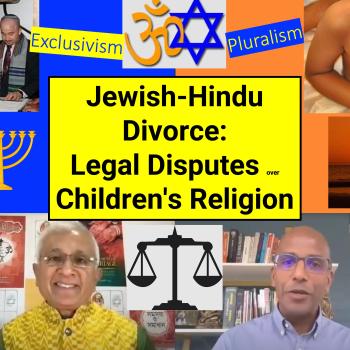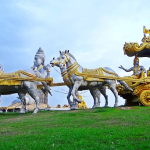My book’s emphasis on difference is mainly about differences in axioms, truth-claims and philosophies. The purpose is to demonstrate that all truth-claims are not the same, and the intent is not to establish the superiority or inferiority of any. Some post-modernists do find all truth-claims to be essentialism, including all scientific claims; however, that is such an extreme view that I shall not bother to address it. My response here is to another kind of charge of essentialism – i.e. the use of terms like West, India, Dharma, Christian.
Because I seek to undermine the notion of a coherent “West”, I need to use the categories in which Western discourse has developed since Hegel’s time, especially since these categories became crystallized in academe, public square, law and politics. I may be accused of using broad definitions, generalizations and extreme contrasts, but we are forced to these categories because the prevailing discourse is defined in terms of them.
When I speak of “the West” vs. “India,” or the “Judeo-Christian religions” vs. the ”dharma traditions,” I am well aware that I may be indulging in the kind of essentialism that postmodern thinkers have correctly challenged. I am also aware that every one of these large categories includes multiple traditions which are separate and often opposed. I view these terms as family resemblances and guides, not as reified or immutable entities – I am conscious of choosing Abrahamic or Judeo-Christian or Christian or Catholic, for instance. Furthermore, most people do understand such popular categories as pointing to actual entities with distinct spiritual and cosmological orientations, even if they can only be defined only approximately. The terms can thus be used as entry points for debate and as foils to contrast both sides, which may help deepen our understanding. They are alive in the public discourse – a simple search of any of these terms will produce tens of millions of hits, hence it is hardly essentialism to use them.
Approximate definitions
“The West” is used in this book to refer to the cultures and civilizations stemming from a rather forced fusion of the biblical traditions of ancient Israel and the classical ones of Greece and Rome. My focus here is on American history and culture, because they are most exemplary of the Western identity today. I investigate European history primarily to uncover the roots of the West’s self-understanding and approach to India, and I give special attention to the role of Germany in shaping the Western approach to dharma. “India” here refers both to the modern nation and to the civilization from which it emerged.
As for the term “Judeo-Christian,” it is a hybrid which does make some Jews and Christians uncomfortable, because it lumps together very different and often sharply opposed religions. I try to avoid using this hybrid where a distinction is important. Nevertheless, this term is useful in designating a religious paradigm that is common to both, particularly with regard to the central importance given to historical revelation.
“Dharma” is used to indicate a family of spiritual traditions originating in India which today are manifested as Hinduism, Buddhism, Jainism and Sikhism. Dharma is not easy to define, and a good deal of this book is devoted to explaining some of its dimensions. The oft-used translations of dharma as “religion,” “path,” “law” and “ethics” all fall short in substantial ways. Suffice it to say that the principles and presuppositions of dharma are available in classical Sanskrit terms which often have no exact translation in English; dharma encompasses a diversity of lifestyles and views which have evolved over many centuries. I am conscious of the internal diversities among them and do not try to overcome these differences. But I wish to explore how the variety of perspectives and practices of dharma display an underlying integral unity at the metaphysical level which undergirds and supports their openness and relative non-aggressiveness.
As I have just noted, Western foundational concepts and values stem not from one source but from two: Judeo-Christian historical revelations expressed through prophets and messiahs, and Greek reason with its reliance on Aristotelian logic and empirical knowledge. Subsequent events in European history led to further “digestions” of civilizations as a result of colonization, conquests, slavery, etc. I argue at length that the resulting cultural construct called “the West” is not an integrally unified entity but a synthetic one. It is dynamic and also inherently unstable, which has had a devastating effect not only on non-Westerners but on Westerners themselves.
Prevailing discourse relies upon these categories
If the concerns against my alleged essentialism were applied equally to the predominant academic discourse on South Asia, it would become virtually impossible to sustain many fields of study that are popular today – such as Subaltern Studies, Dalit Studies, Minority Studies, Hindu Caste System, to name a few. For, in every one of these instances, the case could be made that the very terms of reference are based on essentialism. The category of Brahmin is not as fossilized as claimed, as there have been numerous flows into and out of Brahmin varna with blurred boundaries, and the same is true of Dalit when it is seen as a fixed entity that endures over time. Nor is the reductionist assumption always true that Brahmins have power while Dalits do not. (Political power in India today rests increasingly with groups identifying as non-Brahmins.) The category of Dalit is further suspect because it is a mishmash of hundreds of independent communities separated by geography, language, ethnicities, traditions, rituals, and so forth.[i] They have had numerous clashes among them, and these have intensified lately. A similar analysis could be made to show that Hindu/Minority are essentialized categories because there are many blends in between. The very notion of “caste” is an essentialized one – in this instance essentialized by Lord Risley first conceptually, and then enforced through the colonial census for several decades under his authority. One would expect that given the concern over essentialism, all such topics of research dissertations, conference panels and grant proposals should be seen as problematic. All courses on specific essentialized categories such as Hinduism, Christianity, Western Religions, Western Civilization, South Asian Religions, etc. should be challenged as promoting essentialism. Yet such categories persist and the academy perpetuates them.
Let me say that I am in favor of abolishing all such essentializing categories, if this could be achieved in practice. I further state that I oppose categories of nation-state as well. But to turn this into the ground reality would entail removing the boundaries that fortify them: removing the US-Mexico border fence, removing all immigration and customs organizations worldwide, and removing all laws that prevent the free flow of Third World Labor (wherein Third World is yet another essentialized category).
My point is that for anti-essentialism to become the ground reality would entail the dismantling of the world order as it exists today. Until that happens – and there is no sign for it to happen in this century especially with the rise of China as a superpower based on essentializing itself – how are we to discuss the problems caused by such hegemonic formations if we are not supposed to referred to the categories which sustain them.
Postmodernism as hypocrisy and preservation of the hegemonic status quo
One is left wondering why the residents of these academic fortresses of essentialism get so concerned when an opponent undermines their own categories by referring to them. One answer could be that this anti-essentialism is a defense mechanism to protect the prevailing essentialism in place. The deep structures where Judeo-Christian axioms are rooted remain often hidden, while at the surface the popular discourse tries to go beyond essentialist boundaries. Both Enlightenment and Post-Enlightenment thought preserve the power structures built on Western Universalism. In fact, the effect of post-modern thought has been precisely to protect and perpetuate the very structures it purports to demolish.
Postmodernism has made it fashionable to advocate that all identities be dismantled or blurred, and views all positively distinctive cultures as being oppressive to weaker or less assertive ones. This idea might at first seem reasonable, and indeed it has started a huge academic bandwagon. But it opens the door to a pervasive cynicism and narrowness of vision with no workable criteria of value in aesthetics, politics or philosophy.
Many popular writers have adopted the postmodern stance and assumed that today’s America exemplifies a society in which hybrid cultures are blurring identities and making all boundaries obsolete. America, according to this view, is on its way to becoming a society free from difference anxiety because American society is becoming freed from its chauvinistic grand narratives.
But beneath the veneer of popular culture, the Western foundation of America, especially with respect to its Judeo-Christian roots, remains largely unchanged. In the American institutions where power resides, one finds little evidence of boundaries being erased. For instance:
- The U.S. government’s foreign policy is designed to retain superiority and protect what is specifically in its interests.
- Corporate multinationals fight for market share and maximize their shareholder profits and valuations much in the manner of playing to win a competitive game.
- Churches fight for “soul market share,” not just among denominations but more ferociously in the heathen-filled Third World.
Postmodern scholars would do well to go beyond the analysis of pop culture and abstract patterns, and to attempt to deconstruct the oppressive Western institutions of government, business and Christianity, where the power structure really resides. American socio-political unity has been achieved and maintained from the beginning through a frontier mentality which has always wanted to annex and expand. Besides America, one finds that the European Union, Russia, China, Japan and the Arab states remain highly nationalistic.
Postmodern Imperialism
The postmodern insistence on denying such identities as “Indian” and “Western” leaves non-Western cultures vulnerable to even further exploitation because they are denied the security of possessing a difference which is real and defensible. Postmodernism, then, tends to undermine the particular reality of the non-Western culture that might be in need of being affirmed, protected and developed.
The London-based Indian Muslim cultural critic Ziauddin Sardar points out that the postmodern criticism of nation-states and their related identities actually empowers imperialism insofar as it “softens the prey” on behalf of the predator empires by advocating the abandonment of distinctiveness in a one-sided manner. This is so because the West does not practice what it exports. The call to abandon distinctiveness is propagated and promoted through a network of intellectuals in the Third World nurtured and sustained by the First World.[ii]
Postmodern philosophers have made many attempts to deconstruct the West’s “meta-narratives,” as they are often called, rightly pointing out that such claims of universalism are in fact parochial and arrogant views of what is merely one cultural tradition among many others. It is perhaps a paradox that the West is simultaneously protecting itself by rewriting its story in a new and renewed chauvinistic mode in which deconstruction itself is seen as the culmination and fruit of its long, singular and ineffably superior philosophical trajectory.
Without an outside perspective on the Western mentalities, the postmodern critiques assume an unfolding consciousness in which Westerners are the leaders and agents. They tend to project their latest theories back into Western intellectual history, thereby enhancing the Western collective identity rather than dissolving it. Although it decries identity, postmodernism is itself the product of a history that has been shaped by particular attitudes to difference and that cannot be assumed to be the template for world history. Postmodernism is highly critical of imperialism and colonialism, yet it has a grand narrative of its own which remains largely outside the bounds of the deconstruction process. Indian traditions are marginalized by the postmodernists.
The power of the U.S.A. and the European Union remains unaffected by the fringe activities of its own liberal postmodern scholars. Ironically, many of the “leftist radicals” of the counterculture in France and the U.S. later became neo-conservatives — because of the temptations of the marketplace and because the sacrifices required by the left proved unsustainable. Only a few years after participating in strikes and anti-war and civil liberties marches, these “radicals” found themselves calling for the defense of “Judeo-Christian civilization” and advocating aggressive but selective “humanitarian” intervention into other countries. The U.S. military has used liberal social scientists to foment conflict in countries such as Chile and, more recently, Iraq. In fact, much of the research into foreign “area studies” is done by liberal scholars and ends up serving the interests of the state and/or church.[iii] At the same time, the West is secure in its sense of history and identity, and that’s because postmodernist discourse in the West is limited to academic cocoons and applied mainly to pop culture – it is not allowed to change the education system of policymaking, for instance.
India’s postmodernist scholars who brag about their Western training and connections are encouraged to deconstruct Indian civilization, showing it to be a scourge against the oppressed. The deconstruction of India by Indian thinkers has a destabilizing effect which invites a new kind of colonialism. The most fashionable kind of difference being championed by Indian postmodernists is on behalf of the subalterns, i.e. “from below,” seen as the oppressed underclass. But many of these “oppressed minorities” have been taken over by global nexuses (Western churches, Chinese Maoists and Islamists, to name only the major ones) with the result that they are not truly autonomous and independent but satellites serving a new kind of remote-controlled colonialism. Thus the postmodern posture on difference has had the overall effect of causing native cultural identities to become vulnerable to imperialism – which is exactly the opposite of what the postmodernists claim they want to achieve. This is a serious topic of inquiry outside the scope of this book and which I cover in my previous book, Breaking India.[iv]
Postmodernism and Digestion
Postmodern deconstruction facilitates the digestion of dharma into the West by disassembling it into a library of random, unrelated components similar to the way clip art is clicked-and-dragged as useful additions to proprietary frameworks. Some scholars take these components apart so as to de-contextualize them from the rest of the dharma tradition, thereby enabling them to be digested or destroyed selectively. The digestion of Indian civilization by the West is encouraged by arguments that there is no such thing as an “Indian civilization,” the claim being that the “Indian” is a construct given, as it were, by the British.
Postmodernism and Dharma
Postmodernism resembles dharma philosophies in several ways. Both are frameworks for the deconstruction of identity. Both approaches share the notion that all concepts are mental constructions which are ultimately empty or devoid of self existence. Many of the postmodern thinkers have been influenced by these Indian traditions – this has been discussed in the literature.
But there is at least one important difference: The Postmodern movement lacks the esoteric practices of the dharma traditions as a means to achieve a state of consciousness transcending differences experientially. Hence, postmodernism is merely discursive deconstruction as an intellectual exercise, and its end-state can be one of nihilism or indifference. In other words, after deconstructing the meta-narratives of the dominant culture, nothing is left to put in their place, whereas in the dharmic case the experience of higher selfhood would provide the foundation for a positive existence.
Dharma also has some anti-essentialism built into it. The notion of sva-dharma (“my personal dharma”) counteracts against essentialist “commandment” style normative dogma. The emphasis upon heuristic self-discovery and enlightenment demolishes history centrism, the pillar of essentialism. The separation of shruti and smriti prevents a fossilized, frozen, final “canon” mindset.
Conclusion
The charge of essentialism is a pedantic one. It is inconsistent with prevailing reality, both on the ground and inside the academy at large. To retreat apologetically from my project of reversing the gaze upon the West would only perpetuate the hegemony of the Western gaze even further. We need to be pragmatic in explaining our positions. This includes the usage of approximate categories which have a lot of momentum on behalf of Western paradigms, and which need to be re-examined.
[i] Many scholars promote the divisive and separatist movements on behalf of Dalits, Dravidians and minority religions by constructing elaborate histories, religions, linguistic models and political identities for them. Their deconstruction methodology is not being used to deconstruct minority identities in the same way. For instance, one does not find them questioning whether a genuine Dalit identity exists at all, given that this is a recent category and those said to belong to it are from thousands of separate jatis across hundreds of miles of separation, with little if any historical contact and no commonality of religion, language or customs. In other words, contrary to the ideals of deconstructing boundaries, in the case of Dalits, Dravidians and certain other groups, their boundaries have been recently constructed using imported theories.
[ii] Sardar, Ziauddin. Postmodernism and the Other: The New Imperialism of Western Culture. London: Pluto Press, 1998..
[iii] Horowitz, David. Containment and Revolution: Western Policy towards Social Revolution: 1917 to Vietnam. London: Blond, 1967.
[iv] Malhotra, Rajiv and Aravindan Neelakandan. Breaking India. Delhi: Amaryllis, 2011.















